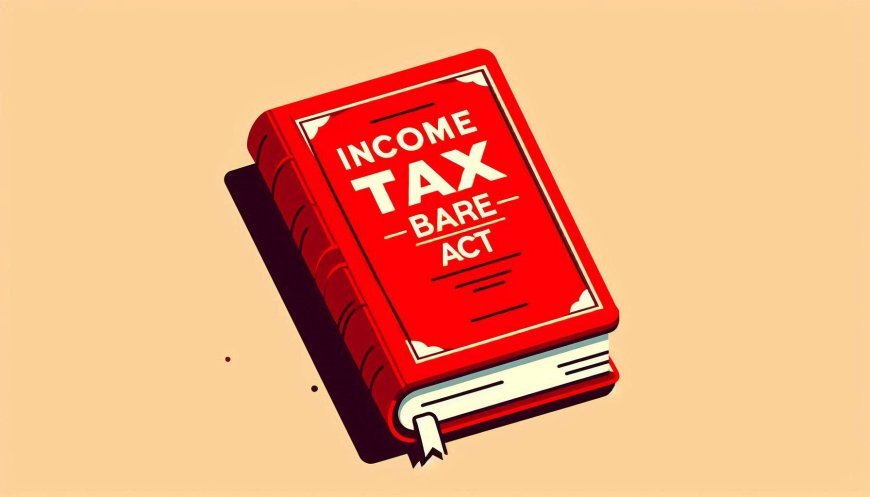Why the Income Tax Bare Act Remains Relevant in 2025

In today’s rapidly evolving legal and financial environment, one might assume that traditional legal resources like Bare Acts are being overshadowed by modern legal tech, AI-driven platforms, and dynamic commentaries. However, this is far from the truth. The Income Tax Bare Act continues to be a cornerstone for tax professionals, law students, academicians, and practitioners in India—even in 2025.
Understanding the relevance of the Income Tax Bare Act isn’t just a matter of tradition—it’s about recognizing its foundational role in interpreting, applying, and complying with the Income Tax Act, 1961. Whether you’re appearing for competitive exams or managing high-stakes litigation, this unembellished version of the law is a non-negotiable tool. And when sourced from reputed legal publishers like LexisNexis, the reliability and accuracy of your reference material are unmatched.
What Is the Income Tax Bare Act?
The Income Tax Bare Act is the uncommented, original text of the Income Tax Act, 1961. It includes all statutory provisions, schedules, and amendments in their purest legal form—without interpretations, judicial references, or author commentary.
Unlike textbooks or legal commentaries, the Bare Act is free of opinion. It tells you what the law says, not what someone thinks it means. This makes it a neutral and authoritative source of legal information that holds up in any academic or legal setting.
Why the Bare Act Is Still Critical in 2025
1. The Foundation of Every Legal Interpretation
Every case, ruling, or advisory related to taxation starts with one basic step: reading what the law says. Judges, lawyers, tax authorities, and academicians all begin with the statutory text before turning to interpretations or case law. No matter how advanced AI tools become, they all draw from the Income Tax Bare Act as their legal source.
In 2025, with complex litigation involving digital asset taxation, cross-border investments, and new-age business models, it is more important than ever to go back to the raw language of the law.
2. Supports Annual Tax Amendments and Budgetary Changes
Each Union Budget and Finance Act brings numerous amendments to tax laws. These changes are promptly incorporated into the updated versions of the Income Tax Bare Act, especially in editions published by LexisNexis, which maintains rigorous editorial standards.
For instance, the Finance Act 2025 introduced changes in:
-
Taxation of virtual digital assets (VDAs)
-
Revised slab rates
-
TDS provisions on foreign remittances
-
New exemptions for startups and MSMEs
All these provisions are seamlessly included in LexisNexis’ latest Bare Act editions, making them a current and reliable reference tool.
3. Indispensable for Exam Preparation
Aspiring Chartered Accountants (CA), Company Secretaries (CS), Cost Accountants (CMA), and Law students preparing for Judiciary exams cannot rely solely on guidebooks. Examiners often frame questions directly from the text of the Income Tax Bare Act, especially from:
-
Section definitions (like Sec 2(24): Income)
-
Procedural provisions (such as Sec 139: Return filing)
-
Penalty sections (like Sec 271 and 270A)
Reading from the Bare Act builds conceptual clarity, reduces misinterpretation, and prepares students for practical tax application. It is common for rank-holding students to cite LexisNexis Income Tax Bare Act as their go-to study companion due to its reliability and precision.
4. Required for Litigation and Tax Advisory
In legal practice or professional tax advisory, quoting the exact words of the statute is crucial. A small misreading of a word like “may” vs “shall” can completely alter the meaning of a provision. Legal representatives, AOs, and judicial authorities strictly refer to the Bare Act to determine legislative intent.
Whether you're arguing a case before the Income Tax Appellate Tribunal (ITAT) or providing advice on exemptions under Section 10, your first step should be the Income Tax Bare Act—not a blog post or third-party summary.
5. A Legal Document, Not Just a Learning Tool
Many people mistake the Bare Act for a mere educational resource. In fact, it is a legal document, accepted in courts and cited in judgments. Commentaries may help explain the law, but only the text of the Bare Act is admissible as legislative authority.
Even digital tools and legal research platforms ultimately quote provisions from the Bare Act. That’s why professionals still keep physical or PDF versions of the Income Tax Bare Act, often preferring reputed editions from LexisNexis for their trustworthiness.
6. Cost-Effective, Accessible, and Portable
One of the biggest advantages of the Bare Act is its cost-effectiveness. Unlike large commentaries or online subscriptions, the Income Tax Bare Act—particularly pocket editions from LexisNexis—provides maximum value at minimal cost.
You can carry it in your bag, highlight key provisions, and use it as a ready reference tool during meetings, hearings, and classroom sessions. In a field where updates and details matter, this portability is a huge benefit.
Why Choose LexisNexis for the Income Tax Bare Act in 2025?
LexisNexis is one of the most respected names in legal publishing. Its Bare Act editions are known for:
-
Timely updates aligned with the latest Finance Acts
-
Clear formatting for easy section-wise navigation
-
Footnotes and references to amendments
-
Durable paper and professional layout
-
Trusted by law schools, libraries, courts, and top CA institutes
Whether you're a beginner or an experienced tax professional, the LexisNexis Income Tax Bare Act will be as a dependable reference tool throughout your career.
Conclusion
In 2025, the world of tax law may be faster, more digitized, and increasingly complex—but the need for clarity and accuracy remains the same. The Income Tax Bare Act is not just a learning tool or legal formality—it’s the source of truth for all tax law in India.
From students preparing for CA exams to lawyers presenting arguments in court, the Bare Act is the starting point and the last word. And when sourced from a trusted legal publisher like LexisNexis, you can be confident that what you’re reading is both current and correct.
What's Your Reaction?

























































